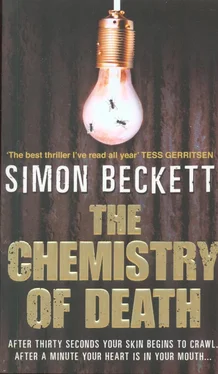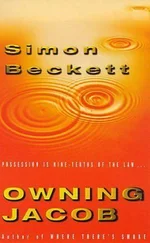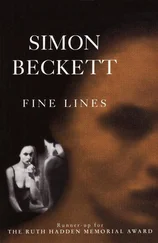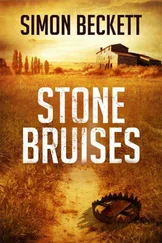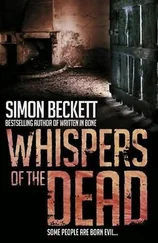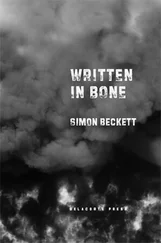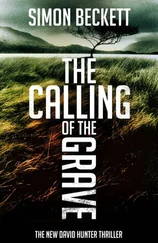Simon Beckett - The Chemistry of Death
Здесь есть возможность читать онлайн «Simon Beckett - The Chemistry of Death» весь текст электронной книги совершенно бесплатно (целиком полную версию без сокращений). В некоторых случаях можно слушать аудио, скачать через торрент в формате fb2 и присутствует краткое содержание. Жанр: Триллер, на английском языке. Описание произведения, (предисловие) а так же отзывы посетителей доступны на портале библиотеки ЛибКат.
- Название:The Chemistry of Death
- Автор:
- Жанр:
- Год:неизвестен
- ISBN:нет данных
- Рейтинг книги:5 / 5. Голосов: 1
-
Избранное:Добавить в избранное
- Отзывы:
-
Ваша оценка:
- 100
- 1
- 2
- 3
- 4
- 5
The Chemistry of Death: краткое содержание, описание и аннотация
Предлагаем к чтению аннотацию, описание, краткое содержание или предисловие (зависит от того, что написал сам автор книги «The Chemistry of Death»). Если вы не нашли необходимую информацию о книге — напишите в комментариях, мы постараемся отыскать её.
The Chemistry of Death — читать онлайн бесплатно полную книгу (весь текст) целиком
Ниже представлен текст книги, разбитый по страницам. Система сохранения места последней прочитанной страницы, позволяет с удобством читать онлайн бесплатно книгу «The Chemistry of Death», без необходимости каждый раз заново искать на чём Вы остановились. Поставьте закладку, и сможете в любой момент перейти на страницу, на которой закончили чтение.
Интервал:
Закладка:
It held the vague shape of the body that had been lying on it, a silhouette of rot. A few maggots still squirmed, and white feathers were scattered like snowfall on the black and flattened stalks.
I examined one of the feathers. 'Were the wings definitely from a swan?'
'We think so,' one of the crime scene officers said. 'We've sent them to an ornithologist to find out.'
'How about soil samples?'
'Already at the lab.'
The iron content of the soil could be checked to see how much blood it had absorbed. If the victim's throat had been cut where the body was found, the iron content would be high; if not, then either the wound had been made after she was dead, or she'd been killed somewhere else and her body dumped here later.
'What about insects?' I asked.
'We have done this before, you know.'
'I know. I'm just trying to find out how far you've got.'
He gave an exaggerated sigh. 'Yes, we've taken insect samples.'
'What did you find?'
'They're called maggots.'
It raised a few snorts. I looked at him.
'What about pupae?'
'What about them?'
'What colour were they? Pale? Dark? Were there empty shells?'
He just blinked at me, sullenly. There was no laughter now.
'How about beetles? Were there many on the body?'
He stared at me as though I were mad. 'This is a murder inquiry, not a school biology project!'
He was one of the old school. The new breed of crime scene investigators were keen to learn new techniques, open to any knowledge that might help them. But there were still a few who were resistant to anything that didn't fit into their proscribed experience. I'd come across them every now and again. It seemed there were still some around.
I turned to Mackenzie. 'Different insects have different life-cycles. The larvae here are mainly blowfly. Bluebottles and greenbottles. With the open wounds on the body we can expect insects to have been attracted straight away. They'll have started laying eggs within an hour if it was daylight.'
I poked about in the soil and picked up an unmoving maggot. I held it out on my palm. 'This is about to pupate. The older they are the darker they get. By the look of this I'd say it was seven or eight days old. I can't see any husk fragments lying about, which mean no pupae have hatched yet. The blowfly's full life-cycle takes fourteen days, so that suggests the body hasn't been here that long.'
I dropped the pupa back into the grass. The other officers had stopped work to listen now.
'OK, so from basic insect activity you're looking at a preliminary time-since-death interval of between one and two weeks. I take it you know what this stuff here is?' I asked, indicating the traces of yellow-white substance clinging to some of the grass.
'It's a by-product of decomposition,' the crime scene officer said, stiffly.
'That's right,' I said. 'It's called adipocere. Grave wax, as it used to be known. It's basically soap formed from the body's fatty acids as the muscle proteins break down. That makes the soil highly alkaline, which is what kills the grass. And if you look at this white stuff you'll see it's brittle and crumbly. That suggests a fairly rapid decomposition, because if it's slow the adipocere tends to be softer. Which fits in with what you'd expect for a body lying outdoors in hot weather, and with a lot of open wounds for bacteria to invade. Even so, there isn't much of it yet, which again fits with a time-since-death of less than two weeks.'
There was silence. 'How much less?' Mackenzie asked, breaking it.
'Impossible to say without knowing more.' I looked at the decaying vegetation and shrugged. 'Best guess, even allowing for a rapid rate of decomposition, I'd say perhaps nine, ten days. Much longer than that in this heat and the body would have been fully skeletonized by now.'
As I was talking I'd been scanning the dead grass, trying to see what I hoped would be there. 'Which way was the body orientated?' I asked the crime scene officer.
'Which way what?'
'Which end was the head?'
He pointed, sullenly. I visualized the photographs I'd seen, how the arms had been outstretched above the head, and moved to examine the ground around that area. I couldn't find what I wanted on the area of dead grass, so I began to extend my search beyond, carefully parting the grass stalks to see what lay at their base.
I was beginning to think nothing was there, that some scavenging animal had discovered it, when I saw what I'd been looking for.
'Can I have an evidence bag?'
I waited till one was produced, then reached into the grass and gently lifted out a wizened brown scrap. I put it into the bag and sealed it.
'What's that?' Mackenzie asked, craning his head to look.
'When a body's been dead for a week or so you start getting skin slippage. That's why it looks so wrinkled on a corpse, like it doesn't fit properly. Particularly the hands. Eventually the skin will slough completely off, like a glove. It's often overlooked because people don't know what it is and mistake it for leaves.'
I held up the see-through plastic bag containing the parchment-like scrap of tissue.
'You said you wanted fingerprints.'
Mackenzie drew his head sharply back. 'You're joking!'
'No. I don't know if this is from the right or left hand, but the other should be around here as well, unless an animal's had it. I'll leave you to find it.'
The crime scene officer snorted. 'And how are we supposed to get prints off that?' he demanded. 'Look at it! It's like a bloody crisp!'
'Oh, it's easy enough,' I told him, beginning to enjoy it. 'Like it says on the packet, just add water.' He looked blank. 'Soak it overnight. It'll rehydrate and you can slip it onto your hand like a glove. Should give you a decent enough set of prints to get a match from.'
I held the bag out to him. 'I'd get someone with small hands, if I were you. And put rubber gloves on first.'
I left him staring at the bag and ducked under the tape. Reaction was beginning to set in. I stripped off the overalls and protective shoes, glad to be rid of them.
Mackenzie came over as I was wadding them up. He was shaking his head. 'Well, you live and learn. Where the hell did you pick that up from?'
'Over in the States. I spent a couple of years at the anthropology research facility in Tennessee. The Body Farm, as it's called unofficially. It's the only place in the world that uses human cadavers to research decomposition. How long it takes under different conditions, what factors can affect it. The FBI use it to train in body recovery.' I nodded over at the crime scene officer, who was bad-temperedly snapping instructions to the rest of the team. 'We could use something like it over here.'
'Fat chance.' Mackenzie struggled out of his own overalls. 'I hate these bloody things,' he muttered, brushing himself down. 'So you reckon the body's been dead for about ten days?'
I peeled off my gloves. The smell of latex and damp skin brought back more memories than I cared for. 'Nine or ten. But that doesn't mean it's been here all that time. It could have been moved from somewhere else. But I'm sure your forensic boys will be able to tell you that.'
'You could help them.'
'Sorry. I said I'd help you identify the body. This time tomorrow you should have a better idea who it is.' Or isn't, I thought, but kept that to myself.
Mackenzie obviously saw through me. 'We've started serious inquiries now to try and find Sally Palmer,' he said. 'No-one we've spoken to so far has seen her since the pub barbecue. She'd got a grocery order she was supposed to be picking up the next day that she never appeared for. And she usually called into the newsagent's every morning for her papers. Avid Guardian reader, apparently. But she stopped collecting that as well.'
Читать дальшеИнтервал:
Закладка:
Похожие книги на «The Chemistry of Death»
Представляем Вашему вниманию похожие книги на «The Chemistry of Death» списком для выбора. Мы отобрали схожую по названию и смыслу литературу в надежде предоставить читателям больше вариантов отыскать новые, интересные, ещё непрочитанные произведения.
Обсуждение, отзывы о книге «The Chemistry of Death» и просто собственные мнения читателей. Оставьте ваши комментарии, напишите, что Вы думаете о произведении, его смысле или главных героях. Укажите что конкретно понравилось, а что нет, и почему Вы так считаете.
